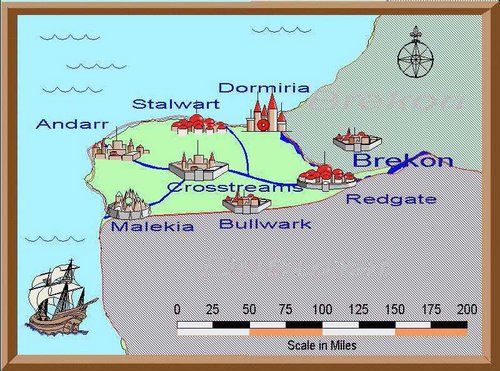Malekia

Malekia, the largest city on the continent dedicated to the forces of evil, sits on the southern branch of the Divalok River.
From an outsider's perspective, the city streets are a tangled and twisted mess of dead end alleys with curious slots in the stone walls, and strange paths leading into courtyards surrounded by towers. For those familiar with the design, Malekia is a death trap for any invading army. Though the city walls are not strong, the layout of the urban anomaly is roughly in the form of concentric rings filled with twisted passages in between. The passages seem random, but they are actually designed to make an invading army become quickly lost and divided in the streets, where the defenders can use the towers and wall slots to murder them as they meander aimlessly.
The residents of Malekia are largely followers of Maleki, though there are significant numbers that follow other gods like The Harpinger, Evrak, Wilsash, Xenon, Kelvos, and Paragus. The second largest following in the city is that of The'ton. Each of these gods has at least one temple in the city, though there is no discernable temple district.
In fact, Malekia has no discernable districts at all, because of its nature.
One would imagine that such a city would be a playground for Thieves guilds, and that the city would contain many of them. However, the term "thief" is rather moot in Malekia, and their "guilds" are basically just "the government". The "guild leaders" are technically nobles, and win their place by many means, usually by right of succession of family, or by combat. Each noble has his or her own police force that patrols certain sections of the city that are accepted to be under their faction's control. However, these areas, or turfs, change constantly.
Malekia does have laws, and oddly enough the laws make no race subject to another strictly on a racial basis, and they outlaw any kind of political coup or toppling of one noble by another. Of course, this does not preclude doing these things without getting caught. There are of course strict penalties for any noble found in an attempt to destroy another.
The population of Malekia is as diverse as any other of The Seven Cities, though there are fewer goodly races and more of the less scrupulous kind present. Outside of Brekon, Malekia possesses the highest goblin and giantkin population of any other place in Negaria. Humans, halflings, and the occasional dwarves can be seen mucking about as well, with a healthy number of orcs present as immigrants from Dubunat which lies only a few miles to the south.
Malekia recognizes that it owes its existance to the confederation of The Seven Cities, and generally does not try to overtly control or disrupt the entity. Of course, many things happen behind the scenes, and there are always attempts to 'extend the confederations holdings into Dubunat', but the orcs of Dubunat take it in stride. In either case, Dubunat encroaches on the affairs of Malekia just as often because it sees the city as a jewel for the taking. Like all the other cities in the confederation, Malekia sends its emissaries to vote on council matters and supply troops to the pool of confederaton soldiers, but the emissaries themselves always change because of internal situations.